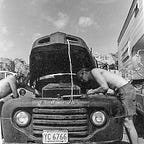This Day in History
May 28th
1754 — Battle of Jumonville Glen. This was the first battle of the French and Indian War. The fight took place in western Pennsylvania, which at the time was the frontier. The ownership of this frontier was contested, with both the French and British staking claim. The British sent a force of Colonists, led by Lt. Col. Geo. Washington, to intercept a group of Canadians, under French direction, who had infiltrated the area. The Canadians numbered about forty and Washington had an equal number, but was joined by about a dozen Mingo Indians led by Tanacharison, also known as Half-King. The leader of the French force was named Jumonville. The Colonists ambushed the Canadians and the fight was over in fifteen minutes with a dozen or so Canadians killed and the rest either escaped or were taken prisoner. The aftermath of this fight became very controversial because of what may or may not have happened next. Eyewitness accounts range from Jumonville being killed in battle, to Washington assassinating him, to Half-King cleaving in his skull with a hatchet. Whatever, the repercussions of this small battle were large, including initiating the French and Indian War, the Seven Year War in Europe, and was even a small step toward America’s eventual independence. And Washington always had to defend himself against what some saw as a black mark on his record.
Competing eyewitness accounts are always tricky.
1940 — Belgium surrenders to Germany. Germany launched its massive attack on May 10th and after eighteen days of fighting, Belgium capitulated. The country had tried to avoid the growing European tension by declaring its neutrality in 1936. It feared France almost as much as Germany, for it understood the former would likely use them as a springboard for an attack on the latter. Which in fact was one of France’s plans, and Belgium’s neutrality infuriated them. Not that any of that really mattered in the face of Germany’s aggressiveness. Belgium remained under Germany’s rule until the fall of 1944 when the Allied forces retook it.
Meant to be pacifying, declaring neutrality has always seemed to me like a wishful step into never-never land. Like trying to preserve one’s dignity when confronted by a bully. That declaration doesn’t really mean much when faced with “So what,” or “Who cares.”
1951 — Willie Mays hits 1st home run. Mays started the season playing for the farm team for the New York Giants, the Minneapolis Millers, where he was hitting an astounding .477. Called up to the major leagues, he struggled and went hitless in his first 12 at bats before connecting for a home run off another future Hall-of-Famer, Warren Spahn. Then he went hitless for another 13 at-bats to begin his career with a frightful 1 for 26. After that rocky start Mays blossomed into possibly the best, and certainly the most exciting, player in the game. Mays ended his career with 660 home runs.
When the Giants abandoned New York and the Polo Grounds, if they had chosen Minnesota instead of San Francisco, the statistics for Mays would have been even more impressive. The brutal and swirling winds of Candlestick Park (the wind once blew a pitcher off the mound) cost him innumerable home runs. I believe Mays would be the home run king and not even those musclemen from the steroid era of baseball would have surpassed him if he had played most of his career somewhere other than Candlestick.
Birthdays:
1738 — Joseph-Ignace Guillotin. The Guillotine is named after him. Guillotin was against the death penalty and belonged to a group in France that lobbied to abolish it. He worked with an inventor and they came up with a machine that was meant to be a more humane, less painful method. The Guillotine was intended to be an intermediate step until the death penalty was eliminated. Guillotin at one point faced the threat of his own invention. He was jailed during the Jacobin Reign of Terror but eventually released. Guillotin was a doctor and devoted the rest of his life to medicine. His family was so embarrassed with the infamous name association they petitioned the French government to change the name, but they refused. The family instead changed its name.
It is indeed one of fate’s great ironies that the man after whom this killing machine is named was against the death penalty.
1908 — Ian Fleming. British writer. Fleming created the James Bond spy thrillers and to date there have been 100 million books sold and 26 films produced featuring this fictional spy. Born wealthy, Fleming led a less than productive life until WWII. There he found his calling and became a naval intelligence officer. Sent to America he worked with Wild Bill Donovan in writing up the blueprint for the OSS, the precursor to the CIA. After the war he became bored, and drawing on his own experiences, began writing the 007 novels. Fleming led a personal life of heavy drinking, gambling, general debauchery and smoking up to three and a half packs of cigarettes a day. He died at age 56, shortly after the Bond films became immensely popular.
Maybe there’s something lacking in me because I’ve never gotten into the Bond movies or books.
1944 — Rudy Guiliani. Politician and lawyer. Mayor of New York City at the time of the 9/11 attacks, federal prosecutor, and currently personal lawyer of President Trump. As a prosecutor he was tenacious in his pursuit of illegal business practices on Wall Street and corruption in government.
Oh that he still held to those same high principles of law.
Sources:
